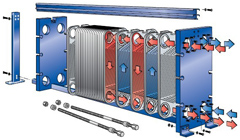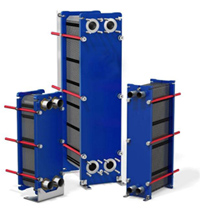 Working Principle
Working Principle
Channels are formed between the plates and the corner ports are arranged so than the two media flow through alternate channels. The heat is transferred through the plate between the channels, and complete counter-current flow is created for highest possible efficiency. The corrugation of the plates provides the passage between the plates, supports each plate against the adjacent one and enhances the turbulence, resulting in efficient heat transfer.
Standard Design
Plate heat exchanger consists of a pack of corrugated metal plates with portholes for passage of the two fluids between which heat transfer will take place.
The plate pack is assembled between a fix frame plate and movable pressure plate and compressed by tightening bolts. The plates are fitted with gasket which seals the interpolate channel and directs the fluids into alternate channels. The number of plates in determined by flow rate, physical properties of the fluids, pressure drop and temperature program. The plate corrugations promote fluid turbulence and support the plate against differential pressure.

The plate and pressure plate are fixed between upper bar and lower bar, both of which are fixed to a support column.
Connections are located in the frame plate or, if either or both fluids make more than a single pass within the unit, in the frame and pressure plates.



